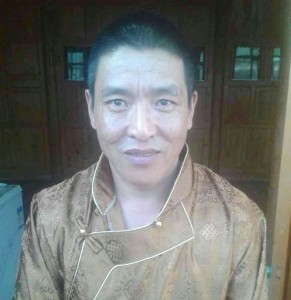Dhondup Wangchen, co-director of the film “Leaving Fear Behind”, was released on June 5, to the delight of his family and the many international groups campaigning for his safe return. He was driven by Chinese authorities to Jotse and delivered into his sister’s care around 3 o’clock in the afternoon.
Dhondup Wangchen was arrested in 2008 following the release of his documentary film “Leaving Fear Behind”. The film is a collection of interviews with native Tibetans living under Chinese rule. In the thirty or so selected interviews, Tibetans openly shared their views on Chinese occupation, the Dalai Lama, and the then-upcoming 2008 Olympics.
Over the past weeks, a widespread campaign has been seeking to keep a spotlight on his forthcoming release, with many concerned that Wangchen would remain in detention. Unchain The Truth, a group started by friends and relatives of those who worked on the film, organised a screening of the documentary and released balloons to mark the occasion. Students for a Free Tibet offered supporters a five-step programme which included sharing their countdown image on Facebook.
These are only the most recent examples of the many ongoing campaigns for Wangchen’s release. Amnesty International has followed his case closely, pressing the government for his early release. He has also received support from Human Rights Watch, Front Line, The Committee to Protect Journalists, Reporters Without Borders, and the Tibetan Centre for Human Rights and Democracy. In a phone call to his cousin, Gyaljong Tsultrin, Wangchen said “I would like to express my feeling of deepest gratitude for all the support I received while in prison and I want to be reunited with my family.”
Dhondup was born on October 17, 1974 in Bayen in the Tsoshar region of Amdo, the northeastern province of Tibet. He received no formal education. Years later, he moved to Lhasa, where he witnessed a pro-independence demonstration which laid the foundation for his later activism.
“Leaving Fear Behind” was conceived in 2007, with the help of monk Jigme Gyatso, and the pair began travelling across Tibet to collect interviews. In a show of bravery and defiance, most of the Tibetans filmed chose to show their faces openly, along with director Dhondup Wangchen. Some 108 interviews were recorded before the material was smuggled out of Tibet in 2008.
Dhondup Wangchen’s cousin Gyaljong Tsultrin, working from Switzerland with his Filming for Tibet team, edited the 40 hours of footage down to a 25 minute film. The film was then returned to Wangchen for release. It premiered at a secret screening for foreign journalists in a Beijing hotel, timed to coincide with the 2008 Beijing Olympics opening ceremony in March.
Days after the film went public, Wangchen and Gyatso were detained by the Chinese government. Wangchen was held for several days in unofficial detention at Gonshang Hotel, before being moved to Xining City No1 Detention Centre, where he was held until April 2009.
Dhondup Wangchen’s first lawyer was dismissed by Chinese authorities, and a second threatened with the closure of his business if he took the case. Wangchen met his legal counsel once before his trial, which was held in a closed court in Xining. He was sentenced to six years imprisonment for subversion on December 28, 2009. Wangchen was then denied access to his lawyer until his right to appeal expired, preventing any appeal of his conviction. He was later moved to to Xichuan Labour Camp in Qinghai Province, where he contracted Hepatitis B and suffered further complications, with his sight potentially at risk.
His wife Lhamo Tso and the couple’s four children travelled to India prior to the film’s initial screening to avoid persecution from the Chinese government. They have since been granted political asylum in the United States.
The film has gained international acclaim and honours for Dhondup Wangchen, including the Committee to Protect Journalists’ 2012 International Press Freedom Award, the Visual Art’s Guild’s 2013 Freedom award and The Human Rights Foundation’s 2014 Václav Havel Prize for Creative Dissent. These awards recognise the bravery of those willing to risk imprisonment and torture in order to share their stories with the world.
“Leaving Fear Behind” was notably screened in Times Square in New York in March 2012, with a live statement from Lhamo Tso. Excerpts from the film were played to the press and public, contrasting sharply with the official Chinese narrative being presented on the Xinhua screen high above. More recently, the film was screened for the European Parliament as part of its January 2014 review of the human rights situation in China.
On Dhondhup Wanchen’s release his wife Lhamo Tso expressed relief and joy, saying “Six years of injustice and painful counting the days ended today. It is a day of unbelievable joy for his parents in Dharamsala, our children and myself. We look forward to be reunited as a family”.
His release now secure, Dhondup Wangchen’s family and supporters await his safe passage from China.
You can watch “Leaving Fear Behind” by following this link:
https://www.youtube.com/watch?v=ANZZa5IabJ4





 Print
Print Email
Email